
Click on any box in the diagram above to get more information about the Member of Government responsible for that role.

Prime Minister
Dr. Rui Maria de Araújo
The Prime Minister has its own competence and that delegated by the Council of Ministers, under the Constitution and the Law.
It is especially incumbent upon the Prime Minister, to lead the Government and to preside over the Council of Ministers; to direct and guide overall policy of the Government and the governing action; represent the Government and the Council of Ministers in their relationship with the President of the Republic and the National Parliament; to guide the overall policy of the Government in its external relations and represent the Government regarding the international community; to lead the overall policy of the Government towards CPLP and ASEAN; to direct and guide the overall policy of the Government concerning defence and security and national intelligence; to coordinate the National Security Integrated System; to lead the overall policy of the Government concerning financial management, which includes bank sector, revenue sector and investment of the Petroleum Fund; to appoint a lawyer, according to the law, to represent the State, in case of judicial disputes where the State takes part; to manage the information technology system of the Government and ensure the provision of the concerning services, as well as implement IT systems in the national territory; to coordinate with the Authority for the Special Administrative Region of Oe-cusse Ambeno the administrative autonomy of the Region.
While head of Government, the Prime Minister has the power to issue instructions to any member of Government and to make decisions on subjects included in the areas of the responsibility of any Ministry or Secretariat of State, as well as to create permanent or temporary committees or workgroups for subjects under the Government.
The Prime Minister also has powers regarding the services, bodies and activities under the Presidency of the Council of Ministers that are not the responsibility of the other members of Government that are part of it, and may delegate this power on any member of Government as well as others legally given to him.
The following services and organisms are under the direct purview of the Prime Minister: National Intelligence Service, Council for Permanent Delimitation of Sea Boundaries, Civil Service Commission, AMRT – Archive and Museum of the Timorese Resistance, E-government ITC and the Supporting Office to the Civil Society.
The Prime Minister is assisted by the Minister of State and of the Presidency of the Council of Ministers; the Minister of State and Coordinator of Social Affairs; the Minister of State and Coordinator of Economic Affairs and the Minister of State and Coordinator of State Administration Affairs and Justice.
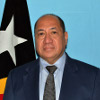
Minister of State and of the Presidency of the Council of Ministers
Agio Pereira
The Minister of State and of the Presidency of the Council of Ministers assists the Prime Minister with the Presidency of the Council of Ministers and with the Government coordination, being the Government spokesperson.
It is primarily up to the Minister of State and of the Presidency of the Council of Ministers to coordinate the preparation and organisation of governmental work, as well as the follow-up and assessment of the decisions taken by the Council of Ministers and the Prime Minister; to coordinate the work meetings of the different Ministers of State and Coordinators of the concerning areas with the Prime Minister for joint assessment of the performance by several Government bodies; to coordinate and implement the reforms to governmental bodies, according to the decisions taken by the Council of Ministers and the Prime Minister; to coordinate the reform of the judicial sector; and to coordinate the legal consultation and support to the Council of Ministers, Prime Minister, Ministers of State and remaining members of Government inside the Presidency of the Council of Ministers.
In addition to the tasks referred to in the preceding paragraph and the ones delegated by the Council of Ministers and the Prime Minister, the Minister of State and of the Presidency of the Council of Ministers also shall: coordinate and centralize the legislative and regulating procedure by the Government; proceed with a thorough study of legal reform, in terms of formal requirements, of standardisation and harmonisation, as well as in assessing the needs of governmental intervention or from the National Parliament; promote a modern legislative procedure, through the use of e-government tools, the disclosure of actions and measures of the Government and organising the form and means of its public intervention; analyse and prepare the legal and regulatory drafts of the Government, in coordination with the proposing ministries; ensure litigation services for the Presidency of the Council of Ministers; Coordinate the legal representatives of the State, in judicial disputes where the State takes part; reply, in collaboration with the concerning ministry, to procedures aiming to verify constitutionality and legality; assure regular coordination with the National Parliament; translate or follow the translation of legal drafts or other documents needed by the Council of Ministers or the Prime Minister; represent the Council of Ministers and the Prime Minister, whenever decided by them, in specially formed committees; propose the policy and draft the legislation needed for the media sector; Monitor the State media bodies; coordinate the dissemination of information on programs and actions of the Government; and act as spokesperson for the Council of Ministers.
It is also incumbent upon the Minister of State and of the Presidency of the Council of Ministers the supervision of the Secretary of State for the Council of Ministers, of the Secretary of State for Parliamentary Affairs and of the Secretary of State for Media.
It is also upon him the supervision of the RTTL – Radio and Television of Timor-Leste, PE and the National Printing.
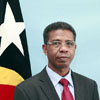
Minister of State, Coordinator of Social Affairs and Minister of Education
António da Conceição
The Minister of State and Coordinator of Social Affairs assists the Prime Minister with the supervision of the general policy for the governance of social affairs, being specifically responsible for the work and activities developed by the Ministry of Education, as the Minister, and Ministry of Health, the Ministry of Social Solidarity, the Secretary of State for Woman Support and Socio-economic Promotion, the Secretary of State for Youth and Sports, the Committee on the Rights of the Child, the National Liberation Fighters and the Commission for Combating HIV/AIDS.
It is primarily up to the Minister of State and Coordinator of Social Affairs to coordinate the preparation and organisation of governmental work for the social field; to follow-up and assess the works and services provided by the Ministry of Health; Ministry of Social Solidarity; Secretary of State for Woman Support and Socio-economic Promotion; Secretary of State for Youth and Sports; Committee on the Rights of the Child; National Liberation Fighters; and the Commission for combating HIV/AIDS; to propose and develop public policies in social areas that account for a better provision of services to the citizens; and to uphold the coordination with relevant entities for social development.
The Minister of State and Coordinator of Social Affairs superintends the Sports National Commission (CND) and the Regulatory Commission for Martial Arts (CRAM).
As the Minister of Education he has competencies to propose and ensure the policy regarding pre-school and school education, comprising basic and secondary education and including special needs education, promoting recurrent education and life-long learning; to take part in the definition and execution of policies regarding qualification and vocational training; to uphold the right to education and assure compulsory education, in order to promote inclusion and equal opportunities; to enforce teaching and learning conditions, adding to the qualification of people and to higher educational attainment and employment; to define the national curricula for the various degrees of education and the assessment regime for students and approve the teaching programs, along with guidelines for its execution; to promote and manage the development and renovation of non-higher education public schools, as well as support any initiatives related with private and co-operative schools; to design policies for higher education, science and technology, including the concerning organization, financing, execution and assessment; to promote equal opportunities of access to higher education; to promote the development, upgrading, quality, competitiveness and international recognition of higher education, scientific and technologic systems; to foster the liaison between higher education, scientific and technologic institutions and between them and the manufacturing system; to raise the permanent assessment and inspection of higher education, scientific and technologic institutions; to foster the assessment of education professionals; and to plan a supervision and analysis system, to assess the results and impacts of education and training policies.
The National University Timor Lorosa’e, the National Institute of Science and Technology, the National Committee of UNESCO, the National Institute for Training of Teachers and Education Professionals (INFORDEPE) and the National Agency for Academic Assessment and Accreditation (ANAAA), are under the supervision of the Minister of Education.
The Ministry of Education is the central Government body responsible for the design, execution, coordination and assessment of the policy defined and approved by the Council of Ministers for the areas of education and qualification, as well as science and technology.
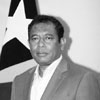
Fernando La Sama de Araújo
From 26/02/1963 to 02/06/2015.
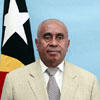
Minister of State, Coordinator of Economic Affairs and Minister of Agriculture and Fisheries
Estanislau da Silva
The Minister of State and Coordinator of Economic Affairs assists the Prime Minister with the supervision of the general policy for the governance of economic affairs, being specifically responsible for the work and activities developed and the provision of related services by the Ministry of Agriculture and Fisheries as the Minister and of Ministry of Agriculture and Fisheries, as the Minister, and the Ministry of Commerce, Industry and Environment, the Ministry of Tourism, Arts and Culture, the Ministry of Public Works, Transports and Communications, the Secretary of State for the Policy of Vocational Training and Employment, the Fishing and cattle farming Industries and the Cooperative Sector.
It is primarily up to the Minister of State and Coordinator of Economic Affairs: to coordinate the preparation and organisation of governmental work for the economic field; to follow-up and assess the works and services provided by the Ministry of Commerce, Industry and Environment; the Ministry of Tourism, Arts and Culture; the Ministry of Public Works, Transports and Communications; the Secretary of State for the Policy of Vocational Training and Employment; the Fishing and cattle farming Industries; and the Cooperative Sector; to propose and develop public policies in economic areas that account for a better provision of services to the citizens; to propose policies and legislation and lay down mechanisms related with the promotion of private investment, national and international, together with the relevant entities; to promote the development of the national private sector and drawing up policies, support mechanisms and incentives to develop the sector; to promote the dialogue with the national private sector regarding the development of the country and about fighting unemployment; and to uphold the coordination with relevant entities for economic development.
The National Centre for Vocational Training and Employment of Tibar, the National Centre for Vocational Training of Becora, the National Institute for Workforce Development, the Inspectorate-General of Labour, the SERVE – Business Registration and Review Service, the Institute of Support to Business Development, the AEI – Specialized Investment Agency, the Commercial National Bank of Timor-Leste, PLC, and the Institute of Research, Development, Training and Promotion of Bamboo, Public Institute, are superintended by the Minister of State and Coordinator of Economic Affairs.
As Minister of Agriculture and Fisheries has competences to: propose the policy and draft the regulation projects required for the areas under its responsibility; ensure the implementation and continuity of rural development programs, in coordination with the Ministry of Commerce, Industry and Environment, the Ministry of State Administration and the Government entity responsible for vocational training and employment; create technical assistance centres for farmers; manage technical and agricultural education; raise agrarian investigation; control the land use for agricultural and livestock purposes; foster and verify animal health; promote the industries of agriculture, livestock and fisheries; foster and oversee food production, including seed production; ensure Quarantine Services; implement a cooperative system for the production and trading of agricultural products; perform feasibility studies for the installation of irrigation systems, water storage and associated facilities; Manage, in coordination with the Ministry of Commerce, Industry and Environment, forest resources and watersheds; foster the development of industrial plants, namely coffee; Manage water resources for agricultural purposes; control and oversee fisheries and fish farming sectors; lay down coordination and cooperation mechanisms with other Government bodies that supervise related areas; manage National Parks and Protected Areas; and ascertain the protection and preservation of nature and biodiversity, overseeing policy execution and supervising any activities that may hinder the integrity of national fauna and flora, together with related entities.
The Ministry of Agriculture and Fisheries is the central Government body responsible for the design, execution, coordination and assessment of the policy defined and approved by the Council of Ministers for the areas of agriculture, forestry, fisheries and livestock.
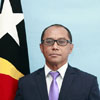
Minister of State, Coordinator of State Administration Affairs and Justice and Minister of State Administration
Dionísio Babo Soares
The Minister of State and Coordinator of State Administration Affairs and Justice assists the Prime Minister with the supervision of the general policy for the governance of State administration and Justice affairs.
He is responsible for the work and activities developed and for the provision of related services by the Ministry of State Administration, as Minister, and by the Ministry of Justice, the Secretary of State for Institutional Strengthening, the Administrative Decentralisation, the INAP – National Institute for Public Administration, and the State General Inspection.
The Minister of State and Coordinator of State Administration Affairs and Justice has competence to: coordinate the preparation and organisation of governmental work for the State administration and Justice fields; follow-up and assess the works and services provided by the Ministry of Justice; the Secretary of State for Institutional Strengthening; the Administrative Decentralisation; the INAP – National Institute for Public Administration; and the State General Inspection; propose and develop public policies for State administration that account for a better provision of services to the citizens; support training and permanent assistance to administrative devolution and decentralisation, in coordination with relevant ministries and institutions; promote less bureaucracy and develop the capacity, transparency and efficiency of State administrative services; promote and supervise the entities responsible for training and enhancement of civil servants; develop and implement a scholarship policy that is competitive and transparent; and uphold the coordination with relevant entities for public administration development.
As Minister of State Administration has the following responsibilities: lead the process of administrative decentralization and the setting up of new services and bodies belonging to the Local Government; support permanent training and assistance regarding the devolution and decentralization processes, in coordination with the Ministries and other relevant entities; coordinate and supervise the activities performed by the peripheral services of the Ministry; lay down coordination and cooperation mechanisms with other Public Administration bodies that supervise related areas; propose the public policy and draft the legislation required for the areas under its responsibility; suggest and execute the legislation to promote urban hygiene and law and order; propose and implement legal provisions on place names; give technical support to elections and referendums; raise policies of local and rural development, to reduce social and economic inequalities, in cooperation with other governmental bodies for its execution; lay down and implement cooperation and technical support mechanisms to traditional community leaderships; suggest and develop standards and technical instruction to classify, treat and archive historical and State documents; and to promote the recovery, preservation and proper care of historical and State documents.
The Ministry of State Administration supervises the Technical Secretariat for Election Administration, the National Archive and the National Institute of Public Administration.
The Ministry of State Administration is the central Government body responsible for the design, execution, coordination and assessment of the policy defined and approved by the Council of Ministers for the areas of local Government, administrative decentralisation, organisation and execution of elections and referendums, promotion of urban hygiene and organization, and classification and preservation of official documents with historical value.
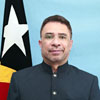
Minister of Foreign Affairs and Cooperation
Hernâni Coelho
The Ministry of Foreign Affairs and Cooperation is the central Government body responsible for the design, execution, coordination and assessment of the policy defined and approved by the Council of Ministers for the areas of international diplomacy and cooperation, consular tasks, and promotion and defence of the Timorese living abroad.
It is incumbent upon the Ministry of Foreign Affairs and Cooperation to: plan, propose and execute the external policy of Timor-Leste, ensuring its unity and consistency; Draft the legal and regulation projects required for the areas under its responsibility; negotiate and recommend the conclusion of international treaties and agreements according to the priorities of external policy for Timor-Leste; promote the external interests of Timor-Leste and protect the Timorese living abroad; represent Timor-Leste in other Countries and International Organizations and manage the network of embassies, missions, permanent and temporary representations and consular posts, according to the priorities of external policy; plan and prepare the accession of Timor-Leste to the Association of Southeast Asian Nations (ASEAN) and represent the country in several meetings and activities; propose and execute the international cooperation policy, together with the Ministry of Finance and other competent government institutions; coordinate, together with the Ministry of Finance and other competent departments of the Government, the relationship of Timor-Leste with development partners; perform the role committed in terms of economic diplomacy issues; and to lay down coordination and cooperation mechanisms with other Government bodies that supervise related areas.
The Minister of Foreign Affairs and Cooperation supervises the ACTL – Cooperation Agency of Timor-Leste.
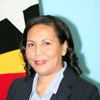
Minister of Finance
Santina Cardoso
The Ministry of Finance is the central Government body responsible for the design, execution, coordination and assessment of the policy defined and approved by the Council of Ministers for the areas of budget and finance annual planning monitoring.
The Minister of Finance has the following responsibilities: propose money and exchange policies in cooperation with the Central Bank; suggest the policy and draft the regulation projects regarding macroeconomics, tax and non-tax revenues, budget framework, public accounting, public finance, auditing and control of the State treasury, issue and management of public debt; manage the petroleum fund of Timor-Leste; Coordinate the projects and programs between Timor-Leste and development partners, in connection with the Ministry of Foreign Affairs and Cooperation; manage the external public debt, State stake holdings and Development partnerships, through the definition and coordination of tax and financial issues; manage the State assets, without prejudice of the role performed by the Ministry of Justice in terms of real estate; foster the management policy regarding movable assets belonging to the State, in cooperation with other competent public entities; manage the supply of procured goods to all the ministries; negotiate, sign and manage the implementation of contracts for public-private partnerships, ensuring its financial assessment to allow a proper risk-sharing between the State and the private partner and the sustainability of each project; foster the setting up of the National Development Bank; draft and publish official statistics; promote the regulation needed and perform the financial control over the State Budget expenses allocated to the other ministries, while pursuing a financial autonomy policy of the services; oversee a correct management of the funding by the State Budget to indirect State administration and local government, through auditing and follow-up; coordinate the national and international technical assistance regarding technical advice to Government bodies, excluding the training of human resources; develop financial management information systems within all services and bodies of the Public Administration, in conjunction with the development of the e-government process; and to lay down coordination and cooperation mechanisms with other Government bodies that supervise related areas.
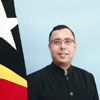
Minister of Justice
Ivo Valente
The Ministry of Justice is the central Government body responsible for the design, execution, coordination and assessment of the policy defined and approved by the Council of Ministers for the areas of justice, land and property, law and human rights.
The Minister of Justice has the following responsibilities: propose the policy and draft the legal and regulation projects required for the areas under its responsibility; suggest measures to define traditional justice mechanisms and its interaction with the formal system; propose and execute measures to broaden the judicial chart; suggest criminal policy and implement it along with good administration of justice; regulate and manage the Legal Training Centre and human resources training for different justice areas; regulate and manage the penitentiary system, enforcement of penalties and social re-integration services; uphold proper mechanisms of access to the law and the courts, specially to the most underprivileged citizens, regarding legal information and counselling and judicial support, through the Public Defender and other justice entities and structures; set up and assure the proper mechanisms that uphold citizenship rights and promote the release of applicable laws; organise the mapping and registration of land and property, namely real estate; ensure a specialized legal translation service to promote official languages in law and justice fields, as a way to foster the access to law by the citizens; manage and supervise registration and notary public services; manage the State real estate; promote and guide the legal training for the judicial careers and remaining civil servants; ascertain international relationships regarding Justice policy, namely with other governments and international organisations, without prejudice of the powers held by the Ministry of Foreign Affairs and Cooperation; and to lay down coordination and cooperation mechanisms with other Government bodies that supervise related areas.
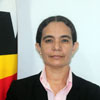
Minister of Health
Maria do Céu Sarmento Pina da Costa
The Ministry of Health is the central Government body responsible for design, execution, coordination and assessment of the policy defined and adopted by the Council of Ministers, for the areas of health and pharmaceutical activities.
The Minister of Health is responsible for proposing policy and develop the projects of regulations necessary for the areas under her supervision; ensure access to health care for all citizens; coordinate the activities related to epidemiological control; perform the health control of products with influence on human health; promote the training of health professionals; contribute to the success in humanitarian assistance, promotion of peace, security and socio-economic development, through mechanisms of coordination and collaboration with other Government agencies responsible for related areas.
The Hospitals of the National Health Service and the Autonomous Service of Medicines and Medical Equipment, Public Institute (SAMES), are under the supervision of the Minister of Health.
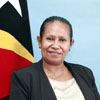
Minister of Social Solidarity
Isabel Amaral Guterres
The Ministry of Social Solidarity is the central Government body responsible for design, execution, coordination and assessment of the policy defined and adopted by the Council of Ministers, for the areas of social security, social assistance, natural disasters and community reinsertion.
The Minister of Social Solidarity has the following responsibilities: design and implement social security systems for workers and rest of the remaining population; develop programs of social assistance and humanitarian aid for the most underprivileged; propose and develop policies and risk management strategies for disasters; develop and implement risk management programs regarding disasters, namely in terms of civic education, prevention, mitigation, urgent response and recovery after disasters; promote programs of demobilization, retirement and pensions for the former National Liberation Fighters; monitor the veterans and National Liberation fighters regarding their integration in society; provide follow-up, protection and community reinsertion of other vulnerable groups; lay down coordination and cooperation mechanisms with other Government bodies that supervise related areas.
The National Centre for Rehabilitation is under the supervision and superintendence of the Minister of Social Solidarity.
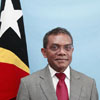
Minister of Commerce, Industry and Environment
Constâncio da Conceição Pinto
The Ministry of Commerce, Industry and Environment is the central Government body responsible for the design, execution, coordination and assessment of the policy defined and approved by the Council of Ministers for the areas of industrial, and commercial economic activities and co-operative sector, as well as environment.
The Minister of Commerce, Industry and Environment has the following responsibilities: propose the policy and draft the regulation projects required for the areas under his responsibility; design, execute and assess the policies on commerce, industry and environment; add to the growth of economic activity, including national and international competitiveness; support the activities of economic agents, facilitating solutions that render procedural requirements simpler and faster; appraise and license projects of installation and operations for industrial and commercial ventures; inspect and supervise commercial and industrial activities and ventures, in accordance with the law; keep and manage an information and documentation centre on companies; propose the qualification and classification of industrial ventures, under the applicable legislation; promote the development of the co-operative sector, specially in rural areas and regarding agriculture, in coordination with the Ministry of Agriculture and Fisheries; promote the importance of the co-operative sector and micro and small enterprises, and promote training on the incorporation, organisation, management and accounting of co-operatives and small companies; organize and administer a register of co-operatives; organize and administer the registration of industrial property; promote international and internal rules for standardisation, metrology, and quality control, measurement patterns for units and physical magnitude; implement the environmental policy and assess the results achieved; promote, monitor and support the strategies for the integration of the environment in sectorial policies; Perform the strategic environmental assessment of policies, plans, programs and legislation and coordinate the environmental impact assessments of projects at a national level; Ensure, in general terms and of environmental licensing, the adoption and supervision of pollution prevention and control measures by the relevant facilities.
The National Logistics Centre is under supervision of the Ministry of Commerce, Industry and Environment.

António da Conceição
From 16/02/2015 to 10/08/2016day he was sworn in as Minister of State, Coordinator of Social Affairs and Minister of Education.
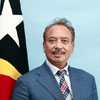
Minister of Tourism, Arts and Culture
Francisco Kalbuady Lay
The Ministry of Tourism, Arts and Culture is the central Government body responsible for the design, execution, coordination and assessment of the policy defined and approved by the Council of Ministers for the areas of tourism, arts and culture.
It is the responsibility of the Minister of Tourism, Arts and Culture to propose policy and develop the projects of regulations necessary for the areas under his supervision; design, execute and evaluate the tourism policy; add to the growth of the tourism sector and suggest measures and public policies for its development; support the activities of economic agents in the tourism sector and facilitate solutions that render licensing procedural requirements simpler and faster; give opinion on requests for information prior to the establishment of tourism businesses; appraise, license projects of facilities and supervise the operation of tourist enterprises; supervise, inspect and monitor recreational games and tourist enterprises, in accordance with the law; maintain and administer an information and documentation centre on businesses and activities in the tourism sector; suspend and revoke licenses for the exercise of tourist activities, in accordance with the law; qualify and classify touristic ventures, under the terms of the applicable legislation; draft the annual plan of promotional activities for the development of tourism with respective cost estimate; implement and execute the legislation relating to the installation, licensing, and verification of the conditions of operation of tourist facilities; establish mechanisms for collaboration with other services and government agencies responsible for related areas, in particular the competent services for planning and physical development of the territory, aiming at the promotion of national strategic areas of development of tourism; cooperate with concerning public bodies and institutes, in promoting and advertising Timor-Leste with investors and tour operators, releasing the necessary information; oversee cultural and touristic events; draft the policy and regulations for the conservation, protection and preservation of the cultural and historical heritage; propose policies for the definition and development of arts and culture; establish policies of cooperation and cultural exchanges with the CPLP countries and cultural organizations, and countries in the region; establish policies of cooperation with UNESCO; promote the creation of the National Library and the National Museum; develop programs to introduce artistic education and culture in the education curricula of Timor-Leste, in coordination with the Ministry of Education; promote the creative industries and artistic creation in Timor-Leste, in its several areas; ensure the adequate preservation of official and historical documents; promote the creation of the Academy of Arts and Cultural Creative Industries of Timor-Leste; protect the rights pertaining to artistic and literary creation.
The Convention Centre of Dili-CCD, the Catering Squares/Food Courts (Metiaut), the Centres of Tourism and Tourist Information, the Implementation Unit of the Academy of Arts, Culture and Creative Industries and the Monitoring Committee of the Academy of Arts, Culture and Creative Industries are supervised by the Minister of Tourism, Arts and Culture.
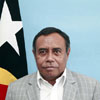
Minister of Public Works, Transport and Communications
Gastão de Sousa
The Ministry of Public Works, Transport and Communications is the central Government body responsible for the design, execution, coordination and assessment of the policy defined and approved by the Council of Ministers for the areas of public works, housing, supply, distribution and management of water, sanitation and electricity, transport and communications.
It is incumbent upon the Minister of Public Works, Transport and Communications to propose and execute the policy lines of the Ministry in the areas of public works, housing, water supply, water resource management, sanitation and electricity; propose and execute the policy lines of the Ministry in the areas of transport and communications; ensure the implementation and enforcement of the legal and regulatory framework related to the activities of the ministry; create and implement the legal and regulatory framework of the activity of the construction industry and research on construction materials; study and perform the works of protection, conservation and repair of bridges, roads, river and sea coasts, in particular concerning flood control; promote the study and implementation of the new Systems of infrastructure networks for distribution of water and water resources, as well as sanitation, and monitor their operation and exploration, without prejudice to the powers committed in these areas to other bodies; establish coordination and promote the quality of physical projects executed by the State; promote the implementation of works of construction, maintenance and repair of public buildings, monuments and special installations, in the cases in which it is the Ministry’s legal responsibility; license and inspect all urban construction, including by private, municipal or autonomous entities, in the terms of the applicable legislation; promote the adoption of technical standards and regulations relating to materials used in the construction industry, as well as develop laboratory tests to guarantee the safety of buildings; maintain and develop a national system of monitoring and information on the state of construction works and on the materials used in construction, including the effects of floods in infrastructures; ensure the coordination of the renewable energy sector and stimulate complementarity between its various modes, as well as their competitiveness, in order to better satisfy users; regulate, in coordination with other ministries, operators in the area of electricity production; establish mechanisms for collaboration and coordination with other Government bodies responsible for related areas; develop and regulate communications activities, and optimize the means of communication; ensure the coordination of the transport sector and stimulate the complementarity between its various modes, as well as their competitiveness, in order to better satisfy users; promote management, as well as the adoption of technical standards and regulations regarding the use of public communications services; ensure the provision of public telecommunications services, and the use of radio-electric space through public enterprises or by granting the provision of public service to private entities; maintain and develop the national systems of weather and seismological information and monitoring, including the construction and maintenance of its infrastructure, and promote and coordinate scientific research and technological development in the fields of civilian land, air and maritime transport.
The Minister for Public Works, Transport and Communications has authority over the Administration of Ports of Timor-Leste – APORTIL, Administration of Airports and Air Navigation – ANATL E. P., the Civil Aviation Authority of Timor-Leste – AACTL, ARC-Regulatory Authority for Telecommunications and the Institute for Equipment Management – IGE.
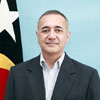
Minister of Petroleum and Mineral Resources
Alfredo Pires
The Ministry of Petroleum and Mineral Resources is the central Government body responsible for the design and execution of the energy policy and management of mineral resources, including oil and other strategic minerals, as approved by the Council of Ministers, as well as for licensing and regulation of extractive activities, industrial activities of improvement of oil and minerals, including the petrochemical and refining industry.
The Minister of Petroleum and Mineral Resources is responsible for: draft and propose the policy and legislation for the sector; establish the sectorial management system and regulate its activities; ensure maximum participation of Timor-Leste in oil and mineral resources activities through the proper legal, administrative and technical instruments; promote national opportunities in this sector in order to capture and consolidate related foreign investment; monitor treaty implementation and follow the execution of relevant sectorial instruments; In coordination with relevant ministries and entities, conduct negotiations regarding the development model of the “Greater Sunrise” field or other issues related with the jurisdiction over the Timor Sea; coordinate the execution of the ‘Tasi Mane’ project and license and monitor the activities developed in territorial areas dedicated to the project; determine, in accordance with the general conditions determined by law, the contractual terms specific to prospecting and exploration of petroleum resources and mining licensing; ensure minimum reserves of fuel and its regular supply to public entities in charge of energy production; regulate, authorize and supervise “downstream” activities, namely export, transport, storage, distribution and trading, wholesale and retail, including the import of crude oil, derived products and minerals; authorize and license manufacturing industry projects located downstream to extraction regarding the processing, upgrading, treatment and conversion of crude oil, oil products and minerals, namely refineries, liquefaction plants, gas or petrochemical; taking into account the complexity and technical expertise associated with the oil and mineral resources sector, approve the environmental licenses in coordination with the competent authorities in the area of Environment; exercise the supervision and superintendence powers over the indirect administration, institutions and State enterprises and develop the knowledge and research of the geological structure of the soil and subsoil and the national hydrogeological resources.
The following entities are under the supervision of the Minister of Oil and Mineral Resources: National Authority of Oil and Minerals, Timor Gap, E. P., the Institute of Petroleum and Geology, I. P. and the Mines of Timor, S.A..
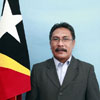
Minister of Defence
Cirilo Cristóvão
The Ministry of Defence is the central Government body responsible for the design, execution, coordination and evaluation of policy, defined and adopted by the Council of Ministers, for the areas of national defence and military cooperation.
It is incumbent upon the Minister of Defence to propose and execute the policy relating to the military component of national defence; draft the regulations necessary to the Defence area; promote military strategic diplomacy, coordinating and guiding the activities arising from military commitments under instruments of international law and multilateral/bilateral agreements, as well as the military relationships with States and international organizations, without prejudice of the powers conferred to the Ministry of Foreign Affairs and Cooperation; ensure defence-related relationships with other countries and international organizations, without prejudice of the powers conferred to the Ministry of Foreign Affairs and Cooperation, under the aims set by the Timorese foreign policy; coordinate and monitor, together with the Ministry of Foreign Affairs and Cooperation, cooperation actions developed by international organizations, States and Defence forces and services of other countries to support the development of the areas under its responsibility, under the international agreements indicated above; administer and supervise the Defence Forces of Timor-Leste; promote the adequacy of military resources and monitor and inspect its use; exercise supervision, administer and monitor the Maritime Authority; supervise military related sea and air navigation and establish mechanisms for cooperation and coordination with other Government bodies responsible for related areas.
The Minister of Defence also supervises the Institute for National Defence.
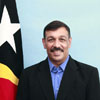
Minister of the Interior
Longuinhos Monteiro
The Ministry of the Interior is the central Government body responsible for the design, execution, coordination and evaluation of policy, defined and adopted by the Council of Ministers, for the areas of internal security, of migration and border control, the civil protection and police cooperation.
It is incumbent upon the Minister of the Interior to propose, coordinate and implement the policies on internal security and civil protection; participate in the definition, coordination and execution of national security policy; draft the regulations needed for the areas under its responsibility; supervise and manage the forces and services of security of Timor-Leste; supervise and manage the Civil Protection Authority, including the Fire Department; ensure and keep public law and order; Uphold the freedom and safety of people and their assets; ensure the safety of movable and immovable State assets; prevent and repress criminality; control the movement of people across borders, the entry, presence, residence, departure and expulsion of foreign people from the national territory; control the import, production, trading, licensing, possession and use of weapons, ammunition and explosives, without prejudice of the powers conferred to other Government bodies; regulate, supervise and control private security activities; supervise civilian sea and air navigation; prevent disasters and serious accidents and provide protection and assistance to populations affected in the event of fires, floods, landslides, earthquakes and in all the situations that put them at risk; develop, in coordination with other competent entities, civic education programs to face natural disasters or man-made disasters, cementing social solidarity; coordinate and monitor the Municipal Security Councils; promote the development of the strategy for prevention, mediation and resolution of community conflicts; promote adequate police means and inspect their use; ensure internal security related relationships with other countries and international organizations, without prejudice of the powers conferred to the Ministry of Foreign Affairs and Cooperation, under the goals set by the Timorese foreign policy; Negotiate, under the leadership of the President of the Republic and the Prime-Minister and in coordination with the Ministry of Foreign Affairs and Cooperation, international agreements about matters under its responsibility, namely regarding internal security, criminal investigation, migration, border control and civil protection; coordinate and monitor, in coordination with the Ministry of Foreign Affairs and Cooperation, cooperation actions developed by international organizations, States, or security forces and services of other countries, in support to the development of its areas of responsibility, in the context of international agreements indicated above, and establish mechanisms for cooperation and coordination with other Government bodies responsible for related areas.
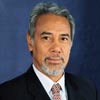
Minister of Planning and Strategic Investment
Kay Rala Xanana Gusmão
The Ministry of Planning and Investment Strategy is the central Government body responsible for the design, execution, coordination and evaluation of policy, defined and adopted by the Council of Ministers, for the areas of promotion of economic and social development of the country.
Through strategic and integrated planning and the rationalization of available financial resources, the Minister of Planning and Strategic Investment takes on specific responsibilities over the implementation of the Strategic Development Plan, particularly in relation to Infrastructure and Urban Planning, Petroleum and Mineral Resources, and Territorial Planning.
It is incumbent upon the Minister of Planning and Strategic Investment, the responsibility over the quality of work and activities for the implementation of physical projects of the Special Funds and other construction works, National Procurement Commission – NPC, and National Development Agency – NDA.
On the basis of the statistical data and records made available by the competent services, it is incumbent upon the Minister of Planning and Strategic Investment to assess the development capital projects, based on careful analysis of the feasibility of the projects and on their respective cost-benefit; supervise, monitor and certify the implementation and execution of the projects, thus contributing to the rationalize the available financial resources, and to the economic development and the economic activity at national, provincial and local level; plan and control costs and quality of development capital projects; promote transparency and quality through the provision of procurement services for development capital projects; develop studies, opinions and technical and sectorial analyses in order to assess the impact and economic viability of development projects; review and select proposals for investment in the country; ensure the coordination and the implementation of Planning for District Integrated Development, in coordination with the relevant entities; ensure the coordination and implementation of the National Program for Suco Development; develop and implement policies and mechanisms to support community and suco development; develop the Program Millennium Development Goals Sucos (MDG Sucos); study, plan and propose policies for sectorial development; study, plan, and propose a national housing and spatial planning policy; study, plan and propose the urban planning, throughout the territory; propose and develop a national policy for natural resources and minerals; support and develop the legal framework and regulate activities related to renewable energy resources; support studies on the capacity of renewable energy resources and alternative energy sources; maintain a record of information about renewable energy operations and resources; contribute to the development of the national policy on transport and communications; help prepare and develop, in cooperation with other public services, the implementation of the road plan for the national territory; provide support for the coordination and promotion of a management system, maintenance and modernization of the airport infrastructure, air navigation, roads, port and related services, and propose and develop a policy of training of human resources, taking into account the needs in the short, medium and long term, and in areas that are crucial to the Development of the country.
The Minister of Planning and Strategic Investment supervises the National Procurement Commission – CNA, the National Development Agency NDA, the Secretariat of Major Projects and the Mission Unit for Integrated Regional Development – TIA.
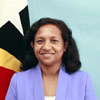
Vice Minister of Education I
Dulce Jesus Soares
Soon available…
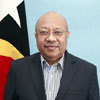
Vice Minister of Education II
Abel da Costa Ximenes
Soon available…
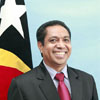
Vice Minister of Agriculture and Fisheries
Marcos da Cruz
Soon available…
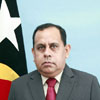
Vice Minister of State Administration
Tomás do Rosário Cabral
Soon available…
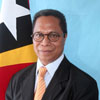
Vice Minister of Foreign Affairs and Cooperation
Roberto Sarmento de Oliveira Soares
The Vice Minister for Foreign Affairs and Cooperation supports the Minister of Foreign Affairs and Cooperation, overseeing the Administration, Planning and Finance, Human Resources and Legal Affairs Services integrated in direct administration of his Ministry.
The Vice Minister for Foreign Affairs and Cooperation is also responsible for services that deal with the consular affairs and protocol, and by all the diplomatic and cooperation matters relating to the Association of Southeast Asian Nations (ASEAN).
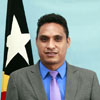
Vice Minister of Finance
Hélder Lopes
The Vice Minister of Finance supports the Minister of Finance in the management of the external affairs of the Ministry, including relations with international organizations and national entities, as well as the coordination of the projects and programs between Timor-Leste and the development partners, in liaison with the Ministry of Foreign Affairs and Cooperation.
The Vice Minister of Finance oversees the preparation and publication of official statistics, as well as other documents prepared by the Ministry of Finance, notably the books of the General State Budget, information for planning and budget implementation reports, among others.
It is his responsibility to coordinate the communication and public relations of the Ministry of Finance and manage political affairs, as well as the connection of the Ministry with the National Parliament and the respective special committees, in terms of the legislative proposals and the provision of information in the Finance portfolio.
The Vice Minister of Finance also oversees the implementation of the tax reform approved by the Council of Ministers.
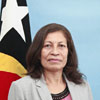
Vice Minister of Health
Ana Isabel Soares
Soon available…
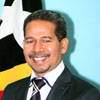
Vice Minister of Social Solidarity
Miguel Marques Manetelu
Soon available…
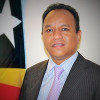
Vice Minister of Commerce, Industry and the Environment
Filipus Nino Pereira
Soon available…

Constâncio da Conceição Pinto
From 16/02/2015 to 10/08/2016 day he was sworn in as Minister of Commerce, Industry and Environment.
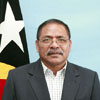
Vice Minister of Public Works, Transport and Communications I
Januário da Costa Pereira
The Vice Minister of Public Works, Transport and Communications I supports the Minister of Public Works, Transport and Communications in the supervision of the internal services responsible for the areas of electricity, water and sanitation.
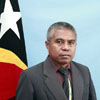
Vice Minister of Public Works, Transport and Communication II
Inácio Moreira
The Vice Minister of Public Works, Transport and Communications II supports the Minister of Public Works, Transport and Communications in the supervision of the internal services responsible for the areas of the land, maritime and air transport, meteorology and geophysics, and postal services.
The Vice Minister of Public Works, Transport and Communications II has, by delegation, the responsibility of the Port Administration in Timor-Leste (PATL), the Public Company of Airports Administration and Air Navigation of Timor-Leste, the Civil Aviation Authority of Timor-Leste and of the National Communications Authority (NCA).
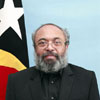
Secretary of State for the Council of Ministers
Avelino Maria Coelho da Silva
The Secretary of State for the Council of Ministers supports the Prime Minister and the Minister of State and of the Presidency of the Council of Ministers, regarding the coordination of the legislative procedure of the Government.
Specifically, he is responsible: to coordinate the drafting and analysis of legal and regulatory projects of the Government, promoting quality, harmonization and simplification of legal and regulatory acts; to coordinate the approval procedure and publication of legal diplomas, ensuring the procedural requirements in hearings for both public and private bodies; translate or follow the translation of legal drafts or other documents needed by the Presidency of the Council of Ministers (PCM) and by the Prime Minister; ensure the provision of legal, informative, technical and administrative support to the Council of Ministers, to the Prime Minister, to the Minister of State and remaining members of the Government integrated within the PCM and assess the impact of legislative acts.
The supervision over the National Printing is delegated to the Secretary of State for the Council of Ministers.
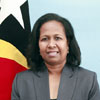
Secretary of State for Parliamentary Affairs
Maria Terezinha Viegas
The Secretary of State for Parliamentary Affairs assists the Prime Minister in the Government’s relations with the National Parliament and with the parliamentary benches.
Specifically, it is the responsibility of the Secretary of State for Parliamentary Affairs: to represent the Government in meetings with the Conference of Representatives of the Parliamentary Benches and other parliamentary bodies, including the Bureau; when requested, represent the Government by issuing legal opinions on legislative, resolution and parliamentary monitoring procedures, where the Government should participate or be called upon; regularly accompany the referred procedures, gathering all the information it deems necessary to keep the Government informed of the development of the various procedural stages; draft information, prepare documentation and draft instrumental notes concerning every relevant activity under the National Parliament, which is not of a purely internal character, to scheduling legislative and resolution initiatives and coordination between the two organs of sovereignty; represent the Government and collaborate, when expressly requested, in the final drafting of legislative acts or resolutions of the National Parliament, that require publication in the Jornal da República (Official Gazette) and keep a documentation and information archive on parliamentary affairs, in order to be able to inform the Government, at any time, on any affair related to the National Parliament.
The supervision of the Office to the Parliamentary Affairs is delegated to the Secretary of State for Parliamentary Affairs.
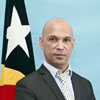
Secretary of State for Social Communication
Nélio Isaac Sarmento
The Secretary of State for Media assists the Prime Minister and the Minister of the Presidency of the Council of Ministers in the Media sector having competencies to promote the development and regulation of the engagement of the media, particularly the press, radio and television.
Specifically, it is the responsibility of the Secretary of State for Media: to coordinate the dissemination of information on Government programs and actions, ensuring transparency and access to information; design, execute and assess public policies for the media; promote and develop the news agency of Timor-Leste and exercise supervision over the State media bodies.
The supervision of both the National Directorate of Dissemination and Information and the Community Radio Centre is delegated to the Secretary of State for Media as well as the superintendence of RTTL – Rádio e Televisão de Timor-Leste, EP.
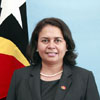
Secretary of State for the Support and Socio-Economical Promotion of Women
Veneranda Lemos Martins
Soon available…
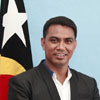
Secretary of State Youth and Sports
Leovigildo Hornay
Soon available…
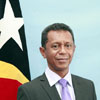
Secretary of State for Employment Policy and Vocational Training
Ilídio Ximenes da Costa
Soon available…

Secretary of State for Institutional Strengthening
Soon available…
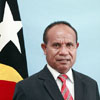
Secretary of State for State Administration
Samuel Mendonça
Soon available…
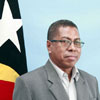
Secretary of State for Land and Property
Jaime Xavier Lopes
Soon available…
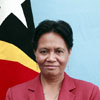
Secretary of State for Arts and Culture
Maria Isabel de Jesus Ximenes
Soon available…